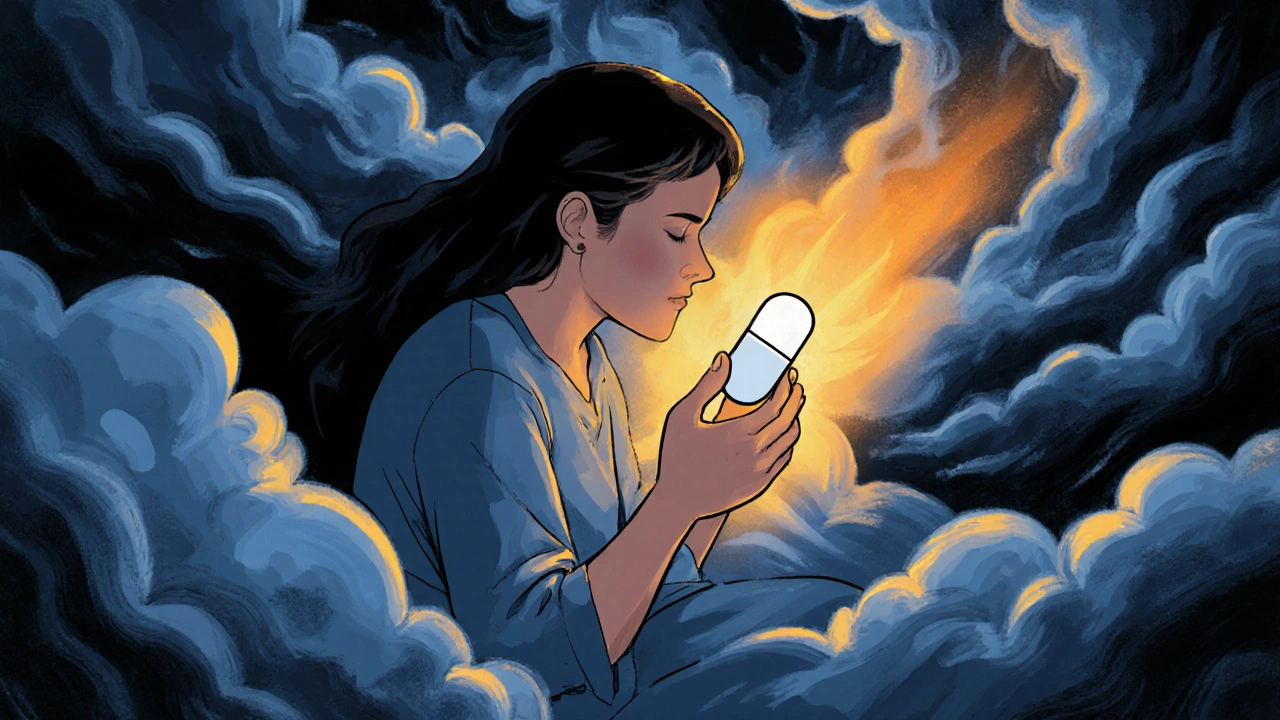
It’s 3 a.m. and your heart is pounding like a drum. You can’t breathe. The room spins. You’ve had panic attacks before, but this one feels different-like your body’s screaming for help. You reach for that small white pill your doctor gave you: alprazolam. Within 20 minutes, the storm inside you calms. For a moment, you feel like yourself again. That’s the power of benzodiazepines. They don’t just ease anxiety-they stop it in its tracks.
But here’s the catch: that same pill that saved you last week could trap you next month.
How Benzodiazepines Work
Benzodiazepines, often called benzos, are drugs that slow down your brain. They do this by boosting a natural calming chemical called GABA. Think of your brain as a busy highway. When you’re anxious, neurons are firing like crazy-cars speeding, horns blaring. Benzodiazepines act like traffic cops, telling those neurons to slow down. The result? Less panic, fewer muscle spasms, deeper sleep.
They’re fast. Really fast. If you’re having a panic attack, a benzo like lorazepam can kick in within 30 minutes. That’s why they’re used in emergency rooms for seizures, in hospitals to sedate patients before surgery, and for people in acute crisis. They work when other medications-like SSRIs-can’t. SSRIs take weeks to help. Benzos help in minutes.
Not all benzos are the same. Some wear off quickly-like triazolam, used only for sleep. Others, like diazepam, stick around for days. That’s why doctors match the drug to the problem. Short-acting ones for insomnia. Longer-acting ones for chronic anxiety or alcohol withdrawal.
The Real Benefits
Let’s be honest: benzos work. And for some people, they’re life-changing.
Take someone with severe fear of flying. They’ve tried therapy. Meditation. Nothing helps. Then they take a single dose of clonazepam before a flight. They sit calmly. Breathe. Arrive at their destination without panic. That’s not laziness-it’s survival.
For people in acute distress-after a trauma, during a panic attack, or in the early days of alcohol withdrawal-benzos can be the only thing that stops the spiral. In hospitals, midazolam is used to stop prolonged seizures. Without it, brain damage or death can follow.
Studies show 60-80% of people with acute anxiety feel significant relief within days. Compare that to SSRIs, which take 4-6 weeks just to start working. For someone on the edge, that difference matters.
And yes, they’re widely used. In 2021, 76 million benzodiazepine prescriptions were filled in the U.S. alone. Women are prescribed them more often than men. Older adults use them for sleep. People with PTSD, phobias, or severe insomnia rely on them.
The Hidden Risks
But here’s what no one tells you when you get the prescription:
Your brain gets used to it.
After just 2-4 weeks of daily use, the calming effect starts to fade. You need more to feel the same relief. That’s tolerance. And it’s not just about needing higher doses. It’s about your brain rewiring itself to need the drug just to feel normal.
Physical dependence isn’t addiction. It’s biology. Even if you take your pills exactly as prescribed, your body adapts. Stop suddenly, and your nervous system goes into overdrive. That’s withdrawal.
Withdrawal symptoms aren’t mild. They include:
- Rebound anxiety-worse than before you started
- Insomnia that won’t quit
- Tremors, sweating, heart palpitations
- Seizures
- Hallucinations
- Feelings of unreality-like you’re living in a dream
A 2022 survey found 23% of people taking prescribed benzos experienced memory gaps-forgetting conversations, meals, even driving routes. That’s anterograde amnesia. It’s not rare. It’s common.
And for older adults? The risks are even higher. The American Geriatrics Society says benzos increase fall risk by 50% and raise dementia odds by 32% in people over 65. That’s why guidelines now say: avoid them in seniors unless absolutely necessary.
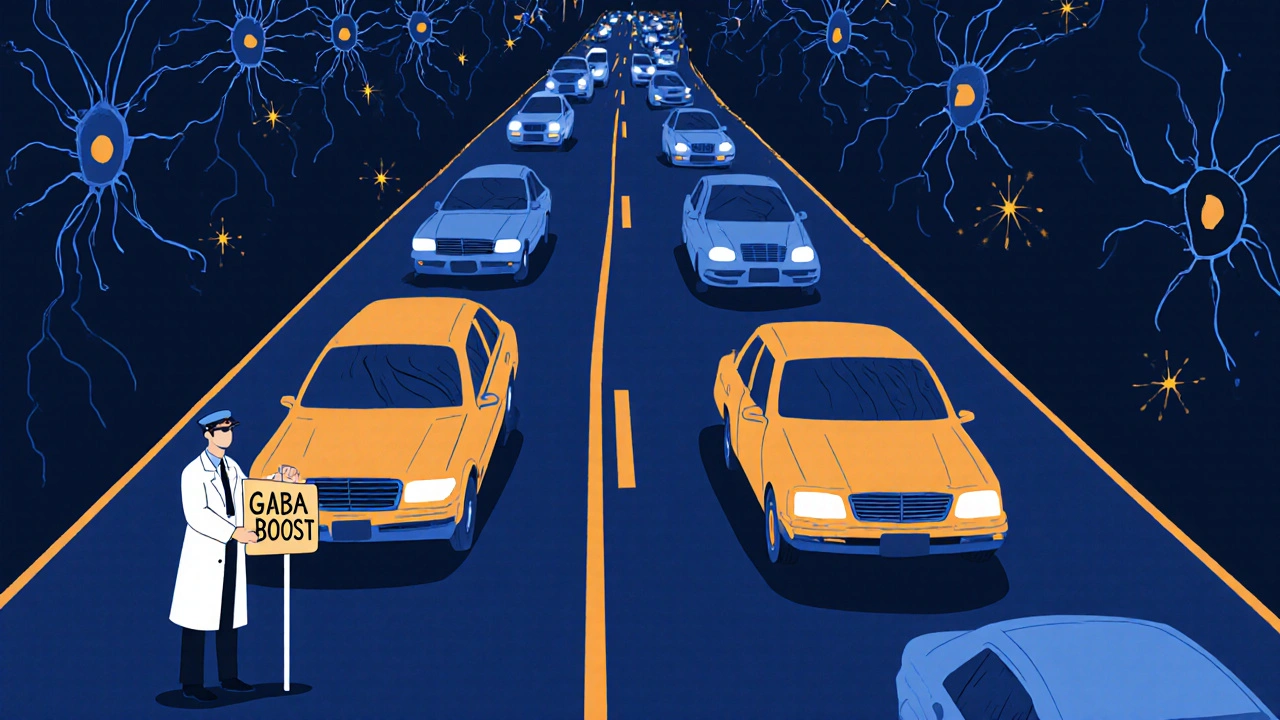
Dependence Is Inevitable-If You Use Them Long-Term
Here’s the hard truth: if you take benzodiazepines every day for more than four weeks, you’re very likely to become dependent.
Studies from the World Health Organization and the Centre for Addiction and Mental Health show 30-50% of people on long-term therapy develop physical dependence-even when following medical advice. That’s not a small risk. That’s the norm.
And once dependence sets in, quitting isn’t a matter of willpower. It’s a medical process.
The Ashton Manual, the gold standard for benzo withdrawal, says most people need 3-6 months to taper safely. Some need over a year. Rushing it leads to severe symptoms-sometimes hospitalization. Many people try to quit cold turkey because they’re scared of the pill. That’s how seizures start.
And here’s the irony: the very thing that helped you feel safe-the benzo-becomes the source of your fear. You’re not addicted because you’re weak. You’re addicted because your brain changed.
What Should You Do Instead?
For long-term anxiety or insomnia, there are better options.
CBT-I (Cognitive Behavioral Therapy for Insomnia) works better than sleeping pills over time. It doesn’t just help you sleep-it fixes the thoughts that keep you awake. And it lasts.
For anxiety, SSRIs and SNRIs are the first-line treatments. They don’t cause dependence. They take longer to work, but they’re safer for months and years.
And here’s something surprising: combining low-dose benzos with therapy reduces dependence risk by 58%, according to a 2023 JAMA study. That’s not a coincidence. Therapy teaches your brain how to calm itself. The benzo just buys you time.
For panic attacks, a single dose before a flight or public speaking can be fine. But if you’re taking it daily for months? That’s a red flag.
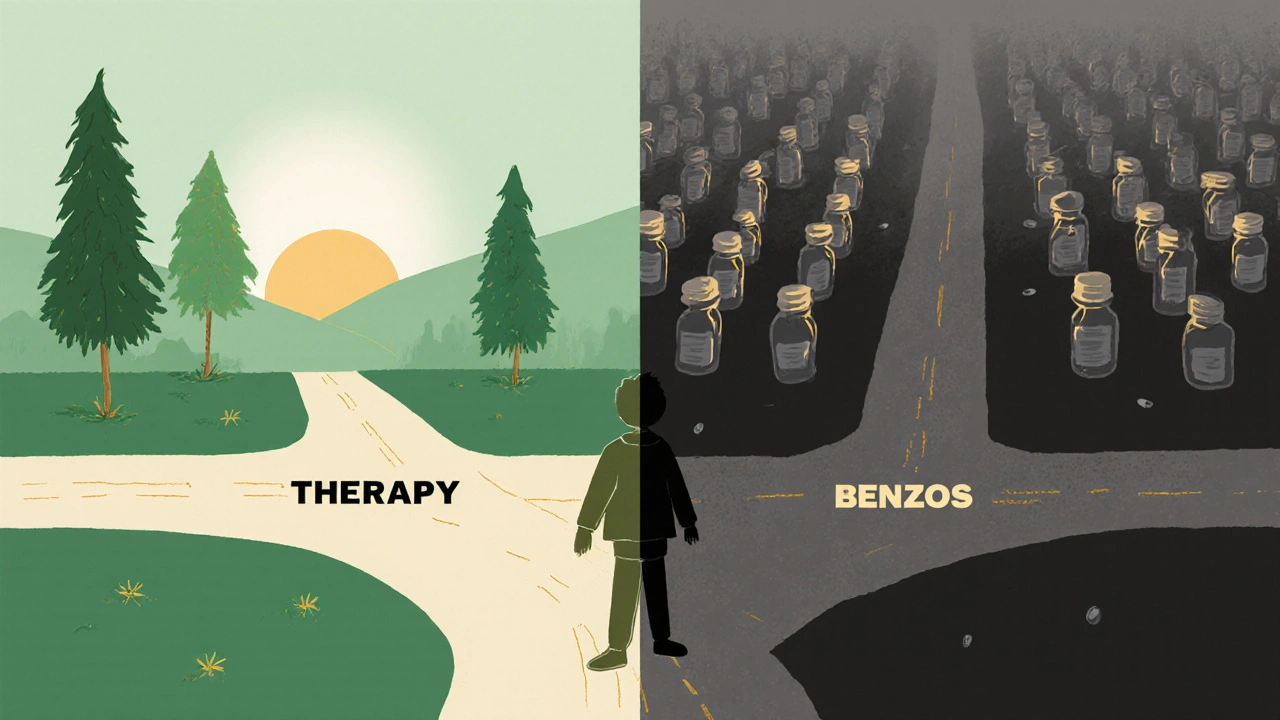
How to Use Them Safely
If you’re prescribed a benzo, here’s how to use it without getting trapped:
- Ask your doctor: What’s the plan for stopping? Don’t just get a prescription. Get a timeline. “Take as needed, max 2 weeks.”
- Never use it daily unless it’s an emergency. Use it for panic attacks, not for daily stress.
- Track your use. Write down when you take it. If you’re using it more than twice a week, talk to your doctor.
- Don’t mix with alcohol or opioids. That combo can stop your breathing. It’s killed thousands.
- Never quit cold turkey. If you’ve taken it for more than a month, taper slowly under medical supervision.
Some clinics now use electronic alerts in patient records. If a doctor tries to prescribe a benzo for longer than 90 days, the system flags it. That’s how seriously this is being taken now.
The Bottom Line
Benzodiazepines are powerful tools. They save lives in emergencies. They give people back their nights. They stop seizures. They calm panic.
But they’re not meant to be a long-term fix.
Using them for more than a few weeks turns them from a rescue into a trap. The dependence isn’t a side effect-it’s the rule. And withdrawal can be more dangerous than the original problem.
If you’re on benzos and feel stuck, you’re not alone. And you’re not weak. But you need a plan-not more pills.
Talk to your doctor. Ask about therapy. Explore non-drug options. And if you’ve been taking them longer than you should-start planning your exit. Slowly. Safely. With support.
Because the best outcome isn’t just feeling calm. It’s feeling calm without needing a pill to get there.
Can you get addicted to benzodiazepines if you take them as prescribed?
Yes. Even when taken exactly as directed, physical dependence can develop after just 2-4 weeks of daily use. This isn’t addiction in the sense of craving or misuse-it’s your brain adapting to the drug. Stopping suddenly can trigger severe withdrawal symptoms. That’s why doctors now limit prescriptions to short-term use.
How long does it take to withdraw from benzodiazepines?
It varies. For short-term use (under 4 weeks), withdrawal may last a few days to weeks. For long-term use (over 6 months), tapering can take 3-12 months or longer. The Ashton Manual recommends reducing doses by 5-10% every 1-2 weeks. Rushing the process increases the risk of seizures and severe anxiety.
Are there safer alternatives to benzodiazepines for anxiety?
Yes. SSRIs (like sertraline or escitalopram) and SNRIs (like venlafaxine) are first-line treatments for chronic anxiety. They take 4-6 weeks to work but have no risk of dependence. For insomnia, CBT-I is more effective long-term than sleeping pills. For acute panic, a single dose of a benzo is still acceptable-but only if it’s not repeated daily.
Why are benzodiazepines still prescribed if they’re so risky?
Because they’re uniquely effective for emergencies. They stop seizures in minutes. They calm acute panic attacks when nothing else works. They ease alcohol withdrawal. For these situations, no other drug matches their speed and reliability. The goal now is to use them sparingly, for the shortest time possible, and only when alternatives won’t do.
Can benzodiazepines cause memory loss?
Yes. Even at prescribed doses, benzodiazepines can cause anterograde amnesia-difficulty forming new memories. A 2022 survey found 23% of users reported gaps in memory during normal daily activities, like forgetting conversations or driving routes. This is more common with longer-acting benzos like diazepam and is a key reason they’re avoided in older adults.
Is it safe to take benzodiazepines with alcohol?
No. Mixing benzodiazepines with alcohol is extremely dangerous. Both are central nervous system depressants. Together, they can slow your breathing to a deadly level, cause unconsciousness, or lead to death. This combination is responsible for a significant number of drug-related emergency room visits and fatalities.
What should I do if I’ve been on benzodiazepines for months?
Don’t stop suddenly. Talk to your doctor about a tapering plan. A slow, controlled reduction-usually 5-10% every 1-2 weeks-is the safest approach. Consider adding therapy, like CBT, to help manage anxiety during withdrawal. Many people successfully taper with support and end up feeling better than before they started.
stephen riyo
Okay but like… I’ve been on 0.5mg alprazolam for 8 months because my therapist said ‘it’s fine if you use it as needed’-but I’m literally taking it every day now and I don’t even know why anymore. I just feel weird without it. Like my brain forgot how to be quiet. And now I’m scared to stop because what if I can’t sleep? What if I panic on the subway? What if I just… stop breathing? I didn’t sign up for this.
Mqondisi Gumede
Benzos are a crutch for weak minds. You think your brain is broken because you feel anxious? Maybe your life is broken. Go live in a village. Walk 10km. Sleep under stars. No pills needed. Modern society made you soft. You don’t need calming chemicals you need a purpose. Stop blaming your biology and start blaming your lifestyle.
Douglas Fisher
I just want to say-I read this whole thing with tears in my eyes. I’ve been through withdrawal. Twice. And no one talks about how lonely it feels. Like your body is betraying you. I tapered for 11 months. I cried every week. But I’m 14 months clean now-and I haven’t had a panic attack in 10 months. It’s not easy. But it’s possible. And you’re not broken. You’re just human.
Albert Guasch
It is imperative to underscore the clinical imperative of pharmacological stewardship in the context of benzodiazepine utilization. The neuroadaptive mechanisms underlying tolerance and dependence are well-documented in the peer-reviewed literature, particularly in the Journal of Clinical Psychiatry, Volume 84, Issue 3. The risk-benefit calculus must be recalibrated for long-term regimens, and non-pharmacological interventions such as CBT-I and mindfulness-based stress reduction demonstrate superior longitudinal outcomes with negligible adverse effect profiles. It is not merely prudent-it is ethically obligatory-to prioritize sustainable modalities over transient pharmacological sedation.
Ginger Henderson
So… you’re saying I can’t just take a Xanax when I’m stressed? Like, ever? What’s the point of modern medicine if I can’t use it for convenience?
Bethany Buckley
Let’s engage in a phenomenological deconstruction of the pharmacological sublime: the benzodiazepine is not merely a GABAergic modulator-it is an existential mediator between the fractured self and the unbearable weight of ontological anxiety. The pill, in its white, unassuming form, becomes a sacrament of modern alienation. We don’t crave the drug-we crave the *absence* of self that it temporarily confers. Withdrawal isn’t physiological-it’s the return of the repressed. And yes, I used the word ‘repressed.’ You’re welcome.
Jesús Vásquez pino
My mom took Klonopin for 12 years. She didn’t even know she was dependent until she tried to quit and ended up in the ER with seizures. Now she’s on SSRIs and does yoga. She’s happier. And she didn’t need to be brainwashed by Big Pharma to get there. Doctors need to stop writing these like candy. It’s not a quick fix-it’s a trapdoor.
hannah mitchell
I’ve been on benzos for 3 years. I didn’t realize how much I relied on them until I tried to go on vacation without them. I sat on the beach and cried because I couldn’t relax. I didn’t even know I could feel that way without a pill. I’m starting therapy next week. I’m scared. But I’m ready.
vikas kumar
As someone from India where mental health is still stigmatized, I want to say-this is one of the most honest posts I’ve read. We don’t talk about this here. People just suffer silently or take whatever pills are handed to them. I hope this reaches someone who needs to hear: you’re not weak. You’re not alone. And help exists-even if it’s slow.
Vanessa Carpenter
I used to take Ativan before every flight. Now I just breathe. I still get nervous-but I don’t need the pill. It took me 8 months to taper. I cried a lot. I had insomnia for months. But now I feel… more real. Like I’m finally living instead of just waiting for the next dose.
Bea Rose
This is why you don’t trust doctors.
Michael Collier
It is a matter of considerable clinical concern that benzodiazepines continue to be prescribed beyond the recommended 2–4 week window, despite overwhelming evidence of dependence liability. Evidence-based guidelines from the American Psychiatric Association and the National Institute for Health and Care Excellence (NICE) explicitly recommend against long-term use. The responsibility lies with both prescribers and patients to prioritize harm reduction and transition to non-addictive alternatives. This is not a matter of opinion-it is a standard of care.
Shannon Amos
So… you’re telling me I can’t use my ‘emergency panic button’ anymore? Cool. I’ll just sit here and feel my feelings like a real adult. /s
Stephanie Deschenes
If you’re reading this and you’re scared to quit-please reach out. I’m a therapist who specializes in benzo withdrawal. I’ve helped over 200 people taper safely. You don’t have to do this alone. Therapy, support groups, and slow tapers work. It’s not a race. It’s a healing process. And you’re worth the time it takes.
Cynthia Boen
This whole post is just fearmongering. My doctor says I’m fine. I’ve been on 2mg a day for 5 years. I’m not addicted. I’m just medicated. Get off your high horse.

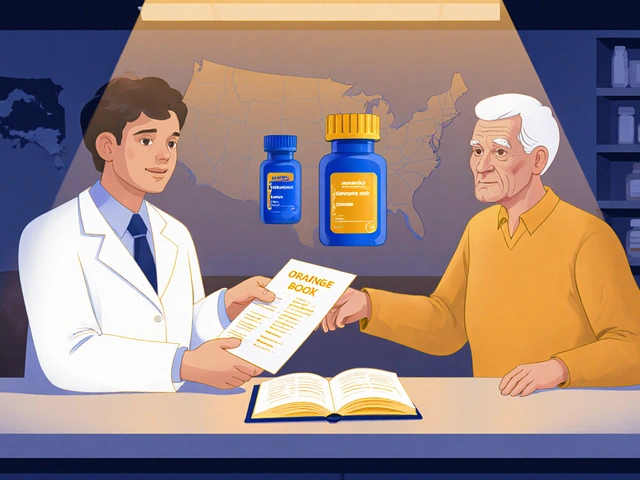
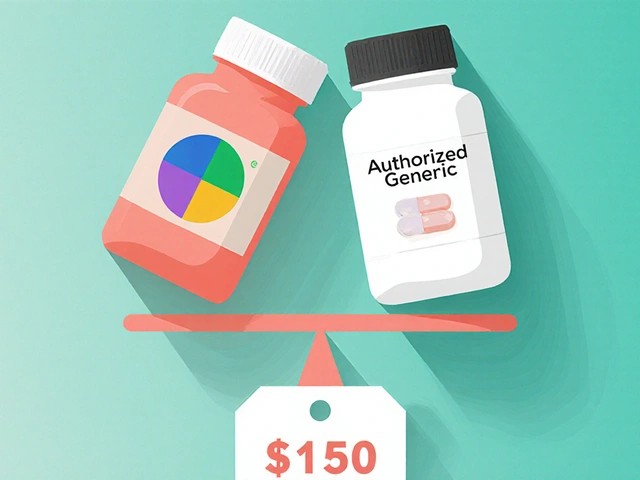
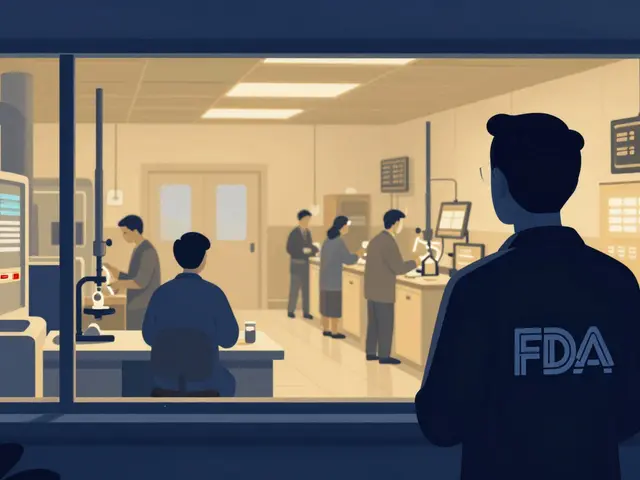
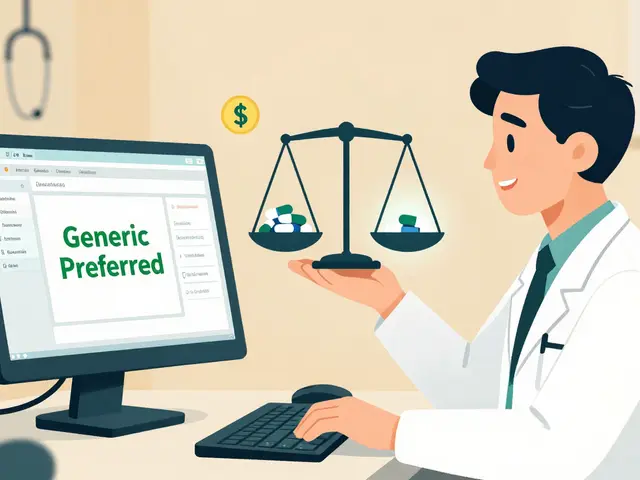

Write a comment